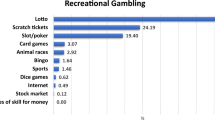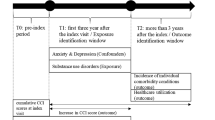Abstract
The rate and correlates of diagnosed pathological gambling (PG) among mental health patients in the Veterans Health Administration, the only national system of mental health care, have not been studied. Using fiscal year 2009 (FY2009) VA administrative data, a case–control study compared those with an ICD code of 312.31 (PG) versus those without. The analytic group was limited to 1,102,846 Veterans Affairs (VA) specialty mental health (MH) services users because 94.5% of all those diagnosed with PG in the U.S. VA health system received such services. Chi-square tests and logistic regression assessed associations between demographic and clinical factors and PG diagnosis. The past-year rate of PG diagnosis among veterans treated in specialty MH program was 0.2%, significantly lower than prevalence rates in other treatment samples and the general U.S population, suggesting under-diagnosis and/or a low-income sample. Being female, ages 40–74, and higher income increased the risk of PG diagnosis, as did past-year homelessness (Odds Ratio (OR) = 2.2), alcohol use disorders (OR = 2.8), bipolar disorder (OR = 2.1) and personality disorders (OR = 2.1). Depression, schizophrenia, and anxiety disorders other than PTSD, were also positively associated with PG diagnosis. Drug use disorder had no significant independent association with PG. PTSD, dementia, and living in isolated rural areas conferred reduced risk. More systematic screening and surveillance of PG among MH service users generally, and veterans with heavy alcohol use, severe mental illness, and homelessness specifically, appears warranted.
Similar content being viewed by others
References
American Psychiatric Association. (2000). Diagnostic and statistical manual of mental disorders (4th edition text revision ed.). Washington, DC: American Psychiatric Association.
American Psychiatric Association. (2010). DSM-V Development. Accessed Nov 2010 from: (http://www.dsm5.org/ProposedRevisions/Pages/proposedrevision.aspx?rid=210).
Barry, D. T., et al. (2009). Differences in characteristics of Asian American and white problem gamblers calling a gambling helpline. CNS Spectrum, 14, 83–91.
Barry, D. T. et al. (2010). Gambling problem severity and psychiatric disorders among Hispanic and white adults: Findings from a nationally representative sample. Journal of Psychiatric Research. doi:10.1016/ipsychires.2010.07.010.
Biddle, D., et al. (2005). Problem gambling in Australian PTSD treatment-seeking veterans. Journal of Trauma and Stress, 18, 759–767.
Blanco, C., et al. (2006). Sex differences in subclinical and DSM-IV pathological gambling: Results from the national epidemiologic survey on alcohol and related conditions. Psychological Medicine, 36, 943–953.
Bland, R. C., et al. (1993). Epidemiology of pathological gambling in Edmonton. Canadian Journal of Psychiatry, 38, 108–112.
Brewer, J. A., et al. (2010). Differential associations between problem and pathological gambling and psychiatric disorders in individuals with and without alcohol abuse or dependence. CNS Spectrum, 15, 33–44.
Castellani, B., et al. (1996). Homelessness, negative affect, and coping among veterans with gambling problems who misused substances. Psychiatric Services, 47, 298–299.
Cunningham-Williams, R. M., et al. (1998). Taking chances: Problem gamblers and mental health disorders—results from the St. Louis epidemiologic catchment area study. American Journal of Public Health, 88, 1093–1096.
Daghestani, A. N., et al. (1996). Pathological gambling in hospitalized substance abusing veterans. Journal of Clinical Psychiatry, 57, 360–363.
Desai, R. A., & Potenza, M. N. (2008). Gender differences in the associations between past-year gambling problems and psychiatric disorders. Social Psychiatry Psychiatric Epidemiology, 43, 173–183.
Desai, R. A., et al. (2007). Gambling, health and age: data from the national epidemiologic survey on alcohol and related conditions. Psychology of Addictive Behaviors, 21, 431–440.
Edens, E. L. et al. (in press). Association of substance use and VA service-connected disability benefits with risk of homelessness among veterans. American Journal on Addictions.
Eisen, S. A., et al. (2004). Lifetime and 12-month prevalence of psychiatric disorders in 8, 169 male Vietnam War era veterans. Military Medicine, 169, 896–902.
Gamache, G., et al. (2003). Overrepresentation of women veterans among homeless women. American Journal of Public Health, 93, 1132–1136.
Grant, J. E., et al. (2005). Impulse control disorders in adult psychiatric inpatients. American Journal of Psychiatry, 162, 2184–2188.
Grant, J. E., et al. (2006). Multicenter investigation of the opioid antagonist nalmefene in the treatment of pathological gambling. American Journal of Psychiatry, 163, 303–312.
Grant, J. E., & Kim, S. W. (2006). Medication management of pathological gambling. Minnesota Medicine, 89, 44–48.
Grant, J. E., et al. (2007). N-Acetyl cysteine, a glutamate-modulating agent, in the treatment of pathological gambling: A pilot study. Biological Psychiatry, 62, 652–657.
Grant, J. E., et al. (2008a). A double-blind, placebo-controlled study of the opiate antagonist naltrexone in the treatment of pathological gambling urges. Journal of Clinical Psychiatry, 69, 783–789.
Grant, J. E., et al. (2008b). Predicting response to opiate antagonists and placebo in the treatment of pathological gambling. Psychopharmacology (Berl), 200, 521–527.
Grant, J. E., et al. (2008c). Daily tobacco smoking in treatment-seeking pathological gamblers: Clinical correlates and co-occurring psychiatric disorders. Journal of Addiction Medicine, 2, 178–184.
Grant, J. E., et al. (2010). Introduction to behavioral addictions. American Journal of Drug and Alcohol Abuse, 36, 233–241.
Hierholzer, R., et al. (2010). Pathological gambling in Combat veterans. Federal Practitioner, 27(8–12), 14–15.
Jiménez-Murcia, S., et al. (2010). Age of onset in pathological gambling: clinical, therapeutic and personality correlates. Journal of Gambling Studies, 26, 235–248.
Kausch, O. (2003). Suicide attempts among veterans seeking treatment for pathological gambling. Journal of Clinical Psychiatry, 64, 1031–1038.
Kessler, R. C., et al. (2008). DSM-IV pathological gambling in the national comorbidity survey replication. Psychological Medicine, 38, 1351–1360.
Ladouceur, R., et al. (1999). Prevalence of problem gambling: a replication study 7 years later. Canadian Journal Psychiatry, 44, 802–804.
Leung, K. S., & Cottler, L. B. (2009). Treatment of pathological gambling. Current Opinions in Psychiatry, 22, 69–74.
Marceaux, J. C., & Melville, C. L. (2010). Twelve-step facilitated versus mapping-enhanced cognitive-behavioral therapy for pathological gambling: A controlled study. Journal of Gambling Studies. doi:10.1007/s10899-010-9196-y.
Pallesen, S., et al. (2005). Outcome of psychological treatments of pathological gambling: A review and meta-analysis. Addiction, 100, 1412–1422.
Pallesen, S., et al. (2007). Outcome of pharmacological treatments of pathological gambling: A review and meta-analysis. Journal of Clinical Psychopharmacology, 27, 357–364.
Petry, N. M., et al. (2005). Comorbidity of DSM-IV pathological gambling and other psychiatric disorders: Results from the national epidemiologic survey on alcohol and related conditions. Journal of Clinical Psychiatry, 66, 564–574.
Pietrzak, R. H., & Petry, N. M. (2005). Antisocial personality disorder is associated with increased severity of gambling, medical, drug and psychiatric problems among treatment-seeking pathological gamblers. Addiction, 100, 1183–1193.
Rosenheck, R. A. (2004). Mental health and substance abuse services for veterans: Experience with mental health performance evaluation in the Department of Veterans Affairs, pp. 423–482. In Institute of Medicine Committee on Crossing the Quality Chasm: Adaption for mental health and substance abuse. Improving the quality of health care for mental and substance-use conditions. Washington, DC: National Academies Press.
Rota-Bartelink, A., & Lipmann, B. (2007). Causes of homelessness among older people in Melbourne, Australia. Australia and New Zealand Journal of Public Health, 31, 252–258.
Rural Health Research Center (2000). About us: RUCA origins. Accessed May, 2010 from: (http://depts.washington.edu/uwruca/ruca-about.php).
Shaffer, H. J., et al. (2002). Gambling disorders among homeless persons with substance use disorders seeking treatment at a community center. Psychiatric Services, 53, 1112–1117.
Shaffer, H. J., et al. (2005). The Iowa gambling treatment program: Treatment outcomes for a follow-up sample. Journal of Gambling Studies, 21, 59–73.
Shelton, K. H., et al. (2009). Risk factors for homelessness: evidence from a population-based study. Psychiatric Services, 60, 465–472.
Westermeyer, J., et al. (2005). Lifetime prevalence of pathological gambling among American Indian and Hispanic American veterans. American Journal of Public Health, 95, 860–866.
Acknowledgments
This research was supported by the Office of Academic Affiliations, Advanced Fellowship Program in Mental Illness Research and Treatment, Department of Veterans Affairs.
Conflict of interest
None.
Author information
Authors and Affiliations
Corresponding author
Rights and permissions
About this article
Cite this article
Edens, E.L., Rosenheck, R.A. Rates and Correlates of Pathological Gambling Among VA Mental Health Service Users. J Gambl Stud 28, 1–11 (2012). https://doi.org/10.1007/s10899-011-9239-z
Published:
Issue Date:
DOI: https://doi.org/10.1007/s10899-011-9239-z




